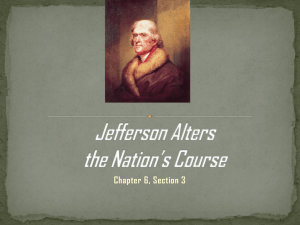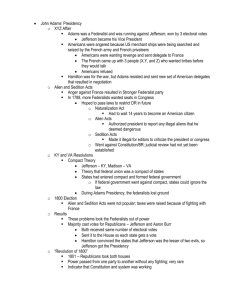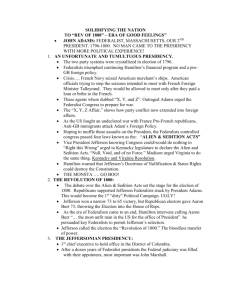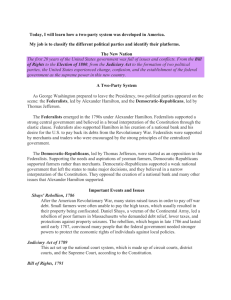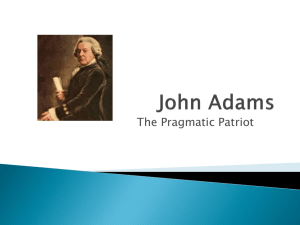For Jefferson?
advertisement
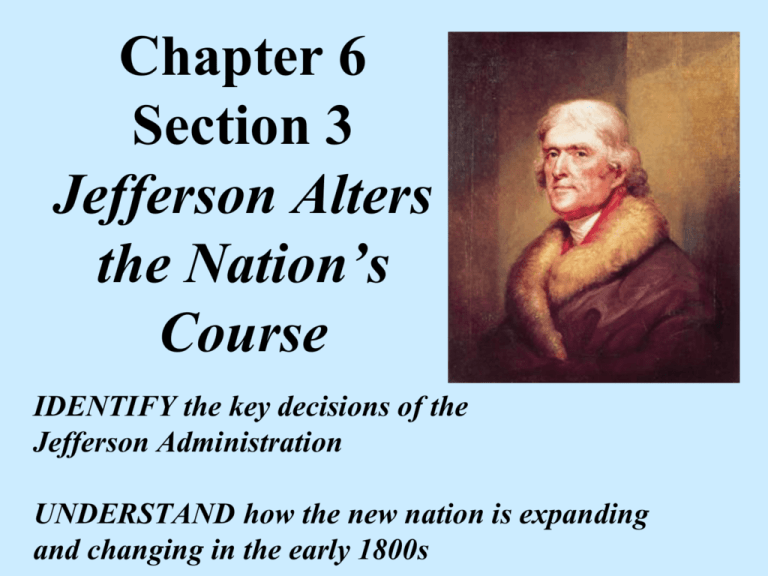
Chapter 6 Section 3 Jefferson Alters the Nation’s Course IDENTIFY the key decisions of the Jefferson Administration UNDERSTAND how the new nation is expanding and changing in the early 1800s 1. Who negotiated a treaty with England in 1794? A. Thomas Pinckney B. Ben Franklin C. John Jay D. John Adams 2. Who negotiated a treaty with Spain in 1795? A. Thomas Pinckney B. Ben Franklin C. John Jay D. John Adams 3. Who won the election of 1800? A. C. John Adams Alexander Hamilton B. James Madison D. Thomas Jefferson 4. Louisiana was purchased from which country? A. Britain B. France C. Spain D. Holland 5. What insult almost resulted in war between France and the US? A. C. Sectionalism XYZ Affair B. Alien and Sedition Acts D. Nullification Election of 1800 Thomas Jefferson Virginia Dem.-Rep. 73 52.9% Aaron Burr New York Dem.-Rep. 73 52.9% http://uselectionatlas.org/RESULTS/ John Adams Massachusetts Federalist 65 47.1% “Revolution of 1800” • Jefferson defeats Adams, 73 to 65 electoral votes • Aaron Burr delivers New York, Federalist stronghold, to Jefferson • South and West are Jeffersonian, growing in power and population • Jefferson and Burr tie. Federalists attempt to give Pres. to Burr, delaying action in the House of Reps for months, taking 35 ballots in all. HISTORICAL SIGNIFICANCE: Power had successfully changed hands in the new republic. Federalists Lose Power HISTORICAL SIGNIFICANCE: Federalists provide period of conservatism that allows for consolidation of revolutionary gains. However, Federalists are unable to adapt aristocratic ideals into appeal to the “common” majority of voters. Jefferson Administration • Virtues practiced are Frugality, Simplicity, Equality – avoid monarchical appearances • Political Moderation and Restraint -employed to ease Federalist fears • Reduced the size of govt. and pursued “free trade” • Increases Southern influence on govt., esp. Virginia’s • Did not employ excessive patronage, many Federalist appointees retain positions The Struggle for the Court • Judiciary Act of 1801 = Adams tries to pack the court with Federalist judges • Midnight judges= the Federalist appointees, including John Marshall as Chief Justice KEY FACT: Appointments were signed but not delivered. DEBATE: Are the appointments of Adams now binding on Jefferson? Marbury v. Madison HISTORICAL SIGNIFICANCE: Establishes the principal of JUDICIAL REVIEW = the ability of the Court to declare an act of Congress or the President unconstitutional. “ The critical importance of Marbury is the assumption of several powers by the Supreme Court. One was the authority to declare acts of Congress, and by implication acts of the president, unconstitutional if they exceeded the powers granted by the Constitution. But even more important, the Court became the arbiter of the Constitution, the final authority on what the document meant. As such, the Supreme Court became in fact as well as in theory an equal partner in government, and it has played that role ever since.” http://usinfo.state.gov/usa/infousa/facts/democrac/9.htm Jefferson Administration Was the incident of the “midnight justices” and Marbury vs. Madison a Failure or Success? For Jefferson? WHY? For the Federalists? WHY? For the Supreme Court? WHY? Federalists Continue to Lose Power • Hamilton attacks Adams, splitting Federalist Party • Adams/Federalists lose election of 1804 • Hamilton seeks to prevent Burr from becoming Gov. of New York in 1804 • 7/11/1804 Hamilton fights Aaron Burr in a duel, and is killed. • Burr kills Federalist leadership, and his own career • Federalists fade Jefferson and Louisiana 1800-1810: Population in the Ohio Valley grows. Daniel Boone clears the Wilderness Road. 1800: Spain cedes trans-Mississippi/LA to France 1802: US loses right to deposit in New Orleans 1803: Jefferson sends envoys to Napoleon 4/30/1803: Frances sells LA for $15 million Why did Napoleon sell? What was the constitutional issue at hand for Jefferson? Who got more than they bargained for? Meriwether Lewis & William Clark • Seeking a Northwest Passage and boundaries of new LA territory • 1804-1806: 2 and ½ year journey, 50 men in Corps of Discovery • Navigated the Missouri, crossed the Rockies, went down the Columbia River to the Pacific and back • Received help from many Native Americans during their journey, esp. Sacajawea, a Shoshone woman who served as interpreter and guide • First Americans to cross the North American continent. • Demonstrated the viability of an overland passage to Pacific • Opened the West to settlement Louisiana Purchase of 1803 • • • • Avoided war with France and Spain Avoided entanglements with Great Britain Vast tracts open for farming for growing population Western expansion favors Jefferson & Republicans, gains loyalty of Western US • Federalists decline further • Establishes practice of “acquisition by purchase” • Establishes power of the President to make treaties Meriwether Lewis & William Clark • • • • • • • • Sought (but did not find) a Northwest Passage Want to establish boundaries of the new LA territory 1804-1806: 2½ year journey of 50 men(Corps of Discovery) Navigated the Missouri, crossed the Rockies, went down the Columbia River to the Pacific and back Received help from many Native Americans during their journey, esp. Sacajawea, a Shoshone woman who served as interpreter and guide First Americans to cross the North American continent. Demonstrated the viability of an overland passage to Pacific Opened the West to settlement The Missouri Breaks Decision Point


